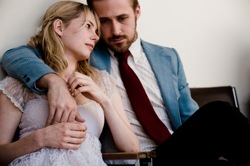
Blue Valentine is a film about the beginning and end of a relationship. Told in a parallel narrative structure, it’s present day scenes depict the breakdown of a marriage while the beginnings of the relationship from six years earlier are revealed in flashback. Co-written and directed by Derek Cianfrance, who has a background in making documentaries, Blue Valentine takes a non-judgemental and observant approach to the dynamics of the relationship that it explores. While there are multiple small reasons for why the relationship sours there is no singled fixed explanation for why it ultimately stops working. Nor is there any attempt to allocate blame to either person and similarly to other marriage-in-crisis films such as Eyes Wide Shut and Revolutionary Road, attempting to argue who was more at fault is futile and misses the point of the film, which is that sometimes love just doesn’t work and that’s a tragedy.
While Cianfrance’s approach may be objective and non-judgemental that doesn’t mean it is not intimate and emotional. A lot of Blue Valentine is shot in a series of close-ups and medium close-ups to pull us into the world of the two characters Dean and Cindy, beautifully played by Ryan Gosling and Michelle Williams. The tightly framed cinematography captures their every reaction, gesture and fleeting expression to communicate a wealth of information about what they are feeling. Both Gosling and Williams have been steadily establishing themselves as two of the finest contemporary actors when it comes to delivering nuanced, convincing and honest performances and their work in Blue Valentine cements this. The combination of restraint and raw emotion displayed by the pair is extraordinary.

Part of the authenticity of Blue Valentine is its open depiction of the sexual dynamic between Dean and Cindy and how their physical intimacy reflects their emotional health. Sex in cinema is so often portrayed as either a titillating transgression, the ultimate symbol of a romantic union or the first moment of true commitment. All of these representations ignore how common sex is in everyday life for a lot of people, whether they are romantically involved or not. Michael Winterbottom’s 9 Songs was an attempt to demystify sex by depicting a short affair through sexual encounters, but the overtly graphic nature of the unsimulated sex distracted from the film’s intent. The sex scenes in Blue Valentine, on the other hand, do succeed in conveying the status of the relationship. During the sections of the film before Cindy begins going out with Dean, we see her having sex with her previous boyfriend and the act is cold and impersonal. The contrast to Cindy’s first sexual encounter with Dean is dramatic as it displays his affection for her in a way that the eroticism of the act is also incredibly romantic. However, between these two flashbacks we see a present day scene where they are staying overnight in a gaudy themed hotel room and Dean is desperately trying to connect with Cindy by having sex with her. The frustrations, anger and resentment that both characters display at this failed encounter is incredibly painful to witness and made all the more bitter by the tender flashback scenes we see later.

The core moment in Blue Valentine is indeed one of the flashbacks where Dean and Cindy do connect and fall in love. It is not a sex scene nor is it a melodramatic outburst of emotion. Instead, it is a spontaneous moment where Dean and Cindy muck around on the street with the warm glow of a shop window providing a welcome juxtaposition to the gloomy blue light of the horrible hotel that we see them staying in six years later. In front of the shop window Dean sings and Cindy dances and the whole situation is goofy, messy and twee. It is also incredibly sweet and the continuous long shot effectively captures this moment of two people falling in love.
The final powerful moment of Blue Valentine is actually the end credits. With the final shot lingering in your mind, and the ramifications of what it means, the effect of the burst of music and having still photographs from the early days of the relationship behind the credits is absolutely devastating. Every once in a while a film arrives that is so honest, so expertly crafted and so sincere that the powerful emotional response it elicits is profound. Blue Valentine is one of those rare films. See it with somebody you are breaking up with.
![]()

Really loved your review of Blue Valentine. Ryan Gosling and Michelle Williams are two of my favorite actors, and this seems to be endowed with such a beautiful passion, but also an unbearable honesty that many romantic dramas are lacking. Released in Sydney on the 26th. I’ll be sure to check it out as soon as I can. All of your reviews here on Cinema Autopsy are fantastic. Keep up the top work!
Regards,
Andy Buckle
It’s easily one of the best films of the year. I’m really pleased that they fought and won to reduce the rating from NC-17 to R so more people can see this beautiful film.
Finally saw it! An impeccable masterpiece with exceptional performances from Gosling and Williams!
This review alone is enough to make me want to watch this movie. I generally avoid sad movies, but Blue Valentine is probably the best feel-bad movie of 2010, so I think I’ll check it out soon.